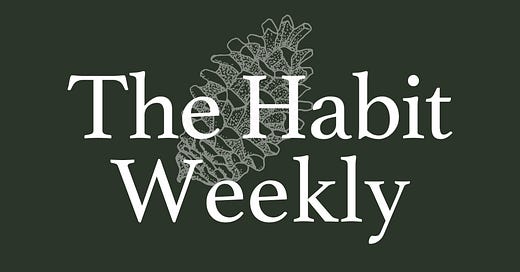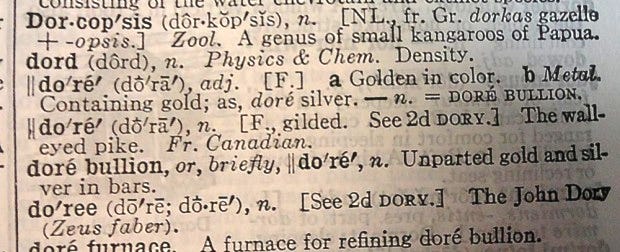Typos! Cicadas! A Moonwalking Bear!
Also, Short Story Summer Camp. This episode of The Habit Weekly is a smorgasbord.
Sorry about Last Week’s Typo!
In last week’s episode, about the duties of the left-brain and the right-brain, I committed a typographical error that more than one of you pointed out to me. I don’t usually beat myself up over a typo here and there. But sometimes a typo is genuinely confusing for readers, and last week’s was one of those. I wrote the opposite of what I meant. I wrote “The right brain makes maps. It reduces the terrain to a schematic that you can use, and that gives you some control over the trip you want to take.” I meant to say that the LEFT brain makes maps. I’m sorry for any confusion, including my own.
That particular typo, resulting in the opposite of my meaning, made me think of what is surely the most famous typo in English-language publishing. A 1631 edition of the Bible, a reprint of the King James Version, came to be known as the “Wicked Bible” because of a typo in Exodus 20:14. It reads, “Thou shalt commit adultery.” So much hinges on the little words! The printers lost their printing license, and most of the copies were destroyed (making the surviving copies highly valuable to collectors). It’s not known whether the typo was the result of carelessness or whether it was an act of sabotage (or perhaps japery).
I went looking for other examples of interesting typos. An inexhaustible source are the errors of cake-decorators, who seem to have a terrible time distinguishing between customers’ instructions and the actual text that is supposed to go on the cakes. Speaking of distinguishing between real text and extra-textual commentary, a lexicographer working on the 1934 Websters New International Dictionary committed a bloomer. That dictionary has an entry for the word Dord. It means “density,” according to that dictionary (and according to no other dictionary that had ever gone before). Apparently, on a draft for the Density entry, an editor had noted that the abbreviation “D or d” signified density. Another editor interpreted that to mean that there was a word “Dord” that meant density and created a new entry accordingly. Feast your eyes:
If you’re interested, here’s a more detailed version of the story from the Merriam-Webster website.
One other fun typo anecdote which, alas, is probably apocryphal: Samuel Beckett told a biographer of James Joyce that he (Beckett) once or twice dictated for James Joyce while Joyce was writing Finnegan’s Wake. In the middle of the dictation, somebody knocked at the door, and Joyce said, “Come in.” Beckett, who didn’t hear the knock, wrote “Come in” in the manuscript. And Joyce, according to Beckett, let it stand. If you’re interested in the details (mostly the details of how it likely didn’t happen the way Beckett told it), you can read them here. (I hope this doesn’t cast doubt on the story that Samuel Beckett sometimes drove young Andre the Giant to school.)
NashvilleCicada and Twitter
I signed up for Twitter thirteen years ago this month. I know because I joined Twitter for the purpose of following a Twitter account called NashvilleCicada. The idea was that during the last cicada hatch, in 2011, a thirteen-year cicada emerged in Nashville and took to Twitter to comment on everything that had changed since 1998. A lot of the jokes were Nashville-specific, but some of them were more general Rip Van Winkle style observations. To wit:
Well that was rude. Just got laughed at by a guy when I asked where the nearest Blockbuster was.
OK so I'm guessing Y2K turned out alright.
I was going to ask how the Bill Clinton thing turned out but I just bumped into Al Gore at Kroger so I think I know.
Well I really thought when I recorded those last 13 Academy Awards it would be easier to find a VCR.
About to turn this sack of Beanie Babies into next month's rent.
2011 is nuts. Last time I was here, the only guy who sold food out of a truck was this sketchy guy on Dickerson Pike who smelled like cheese
Ok, maybe they weren’t quite as funny as I remember. But it was 2011, and people were still figuring out how to be funny on social media. Anyway, in the years since the Nashville Cicada was last here, Twitter has turned into a hellscape. I’ve been hanging in there to see what the Nashville Cicada would have to say about the last thirteen years, but he didn’t come back. About a billion of his relatives did, and they’re screaming outside my window even now. But the first Twitter account I ever followed didn’t wake up this time. I suspect somebody built a tall-skinny house over his burrow—or possibly a boutique catering to bachelorettes. Or maybe NashvilleCicada just had sense enough to avoid the dumpster fire that is Twitter in 2024.
Paying Attention, Again
Ok, I’ve got a little attention test for you. The video below is only a minute long. Please watch it before reading further (it works just as well on mute, by the way—in case you’re afraid of waking somebody up).
That’s pretty remarkable, no?
The assignment (Count the basketball passes) fires up your left brain and effectively shuts down your right brain. When you know what to expect, your left brain says, “I’ll take it from here” and goes about seeing exactly what it expects to see.
The right brain, on the other hand, is open to the reality of what is actually in the world, however surprising and unexpected it may be. The left brain is really good at what it’s good at, but it’s not at all good at seeing what is actually in front of it. As Iain McGilchrist argues in The Master and His Emissary, Western intellectual history has been a steady march toward the idea that “real” knowledge of the world comes from the left brain, with its capacity for linear thinking, clear logic, narrow attention, useful diagrams, algorithms, etc. This is a problem, since the left brain traps us in logical circularities (while also giving us false confidence that we know what we’re talking about…after all, there’s nothing cozier than a logical circle when you’re inside it).
Thankfully, we have the right brain, which is able to see the moonwalking bear that nobody expected but is there nevertheless. More on this in the coming weeks.
Short Story Summer Camp is back!
Short Story Summer Camp 2024 starts on Tuesday, June 11 and runs through Tuesday, July 16. In this six-week class we'll read, analyze, discuss, and be inspired by twelve short stories by twelve different authors. That's twelve different approaches to storytelling, twelve different ways of handing point-of-view, characterization, dialogue, characterization, etc. My hope is that this variety of approach and method will give the writers in the class a lot of new tools and inspire a spirit of experimentation.
In our weekly exercises, you won't just be sharpening specific skills, but moving toward a completed piece of short fiction by the end of the class. Find out more (and register at TheHabit.co/Camp.
Dates and Times:
Tuesdays, June 11 - July 16
1:00-2:30pm Central
(Lecture recordings will be available should you be unable to attend live.)
Cost: $97
* We’re handling the Student Cohort differently this time, limiting it (mostly) to students who are already members of The Habit (Student Edition). If you have a high-schooler who is not already a Habit member but would like to participate in Short Story Summer Camp, send me an email at info@thehabit.co, and we can discuss.
Virtual Writing Rooms on Monday, Tuesday, Thursday, and Friday
Writing Prompt: An Object Passes Hands
Coming soon: Short Story Summer Camp
There's a place for you in this vibrant community of writers. Find out more about The Habit Membership here.
Lore Wilbert on the Life that Grows Out of Death
Lore Ferguson Wilbert writes about spiritual formation, faith, culture, and theology in life. She is the proprietor of an excellent Substack called Sayable. She has also been known to teach writing and do editorial work. Her new book is The Understory: An Invitation to Rootedness and Resilience from the Forest Floor. In this episode, Lore and I talk about what it means to really believe that death can’t help but give rise to life. We also talk about mycorrhizal fungi.








When I read the typo last week, I first thought it was accurate because I, who am strongly right-brained, love maps. But as I read further I realized what you meant, and then I had a mental conundrum: what kind of maps does the left brain work out vs. the maps I love to study? Or was this showing up my slight dyslexia again? I still haven’t answered that complex question. Guess it just reveals my dord.
Another typo that deserves a mention: Malherbe (17C French poet) wrote a consolation to his poet friend Du Périers for the loss of his daughter. In the most probable version of the legend, Malherbe first wrote "Et Rosette a vécu ce que vivent les roses/L'espace d'un matin" (Et Rosette has lived the life of roses/the space of a morning), but the printer made a typo "Et Roselle a vécu ce que vivent les roses/L'espace d'un matin" which gave Malherbe an idea. He changed the verse to: "Et rose, elle a vécu ce que vivent les roses,/L'espace d'un matin" (And a rose, she has lived the life of roses/the space of a morning) which is far superior.